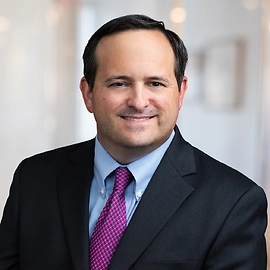On September 12, 2025, the United States Court of Appeals for the Fifth Circuit, in AbbVie v. Fitch, Case No. 24-60375, (5th Cir. 2025), affirmed a federal District Court’s denial of a preliminary injunction sought by the pharmaceutical manufacturer AbbVie.
AbbVie sought to enjoin enforcement of the state of Mississippi’s 2024 law, H.B. 728, which prohibits drug manufacturers from interfering with how a 340B covered entity distributes 340B drugs to eligible patients.
The 340B Program requires drug manufacturers to give discounts to certain categories of safety-net providers under the law – known as "covered entities" – in order to have their drugs covered by Medicaid. Covered entities commonly contract with third-party pharmacies – known as “contract pharmacies” – to dispense drugs to 340B-eligible patients. In recent years, citing concerns relating to the growth of the 340B program, compliance with 340B requirements, and transparency, AbbVie and other manufacturers have implemented restrictions that limit the number of contract pharmacies with which each covered entity can contract. Covered entities counter that these policies undermine the 340B program's intent to serve low-income and uninsured patients and cause hospitals to reduce patient services. AbbVie’s policy restricted covered entities to contracting with a single contract pharmacy within 40 miles of the covered entity.
The U.S. Department of Health and Human Services (“HHS”) took the position that manufacturer policies restricting the use of contract pharmacies violated the 340B statute through an advisory opinion (later withdrawn) in 2020 and subsequent enforcement letters in 2021. In response to the enforcement letters, several manufacturers filed lawsuits against HHS. However, the Third and D.C. Circuits have since upheld the manufacturers’ positions. A decision remains pending in a similar case in the Seventh Circuit.
In response to these developments, several states have passed legislation designed to protect access to 340B contract pharmacies. In 2024, Mississippi passed H.B. 728, which provided that manufacturers:
“[S]hall not deny, restrict, prohibit, or otherwise interfere with, either directly or indirectly, the acquisition of a 340B drug by, or delivery of a 340B drug to, a pharmacy that is under contract with a 340B entity and is authorized under such contract to receive and dispense 340B drugs on behalf of the covered entity,” nor can they “interfere with a pharmacy contracted with” a covered entity.
In June of 2024, AbbVie sued the Attorney General of Mississippi, challenging the law as unconstitutional and seeking injunctive relief. The federal District Court denied AbbVie’s motion for a preliminary injunction and AbbVie appealed to the Fifth Circuit.
AbbVie made two arguments to support its request for injunctive relief. First, AbbVie argued that H.B. 728 is either a physical taking or regulatory taking of AbbVie manufactured drugs for private use and without just compensation. As to the former argument, the Fifth Circuit held that no physical taking is occurring because the Mississippi law does not force manufacturers to sell their drugs to anyone, does not require them to sell larger quantities of drugs at discounted prices than required under the 340B program and that AbbVie still receives the payment to which it is entitled under the Section 340B program. In reaching this conclusion, the Court questioned whether AbbVie could properly assert government deprivation of a property interest, as the Court refused to formally find that AbbVie has a compensable property interest in the drugs regulated by H.B. 728.
Turning to the regulatory takings claim, the Court appeared to question whether the doctrine applies to this set of facts, but the lower court held that it did, and therefore, the Fifth Circuit applied the Penn Central three factor balancing test to determine whether a regulatory takings is occurring under H.B. 728. Starting with the first factor, the Court held that H.B. 728 could have a negative economic impact on AbbVie because “it could increase the number of drugs for which they must provide discounts, and therefore cut into their profits.” However, as to the second factor, the Court found that H.B. 728 does not significantly interfere with drug manufacturers’ reasonable investment-backed expectations because the statutory and regulatory history of the 340B program demonstrates that the use of contract pharmacies was foreseeable and that state law might seek to protect covered entities’ right to dispense 340B drugs at multiple contract pharmacies. As to the third factor, the character of the government action in H.B. 728, the Court found that the law was passed to promote important public interests, such as increasing access to care and expanding covered entity services, not private interests. The Court held that the second and third factors weigh heavily in favor of the state and found that AbbVie could not show a substantial likelihood of success on the merits.
AbbVie also argued that H.B. 728 is preempted by federal law under field preemption and conflict preemption. While the Court rejected the preemption arguments, it acknowledged that H.B. 728 could permit illicit behavior that would violate the 340B program, but, seemingly also expressed skepticism, holding that there was insufficient evidence to support such a finding.
Starting with field preemption, the Court held that the 340B “federal framework is not so pervasive, that Congress left no room for state supplementation.” The Fifth Circuit found that even though 340B expressly regulates certain topics, “it regulates neither the distribution of drugs to patients nor the role of pharmacies in this distribution.” The Court concluded that such areas are to be regulated by the states, finding that Congress “did not intend to occupy the entire field in this area.” The Court also found that H.B. 728 involves two traditional areas of state regulation, public health and consumer protection, and that Congress, through the 340B statute, has not clearly and manifestly shown an “intent to preempt state laws regulating the distribution of drugs to patients and the role of pharmacies in such distribution.”
With regard to conflict preemption, AbbVie had argued that H.B. 728 requires manufacturers to provide drugs at 340B prices to entities—contract pharmacies—other than covered entities authorized under federal law. The Court found this argument to be incorrect because H.B. 728 only compels providing the drugs to contract pharmacies “insofar as they have partnered with covered entities to distribute the drugs to the patients.” AbbVie’s second argument was that H.B. 728 imposes civil and criminal penalties for noncompliance, such that the state is imposing penalties for 340B violations, where 340B enforcement is solely within the power of the federal government. However, the Court found that H.B. 728 imposes penalties related to interference with the distribution of 340B drugs, not penalties for violation of the 340B program itself.
Ultimately, the Court affirmed the preliminary injunction denial and appeared to only skeptically acknowledge AbbVie’s argument that H.B. 728 has the potential to allow covered entities and contract pharmacies to engage in activities that violate the 340B statute, such as improper reselling of 340B discounted drugs. This is the second federal appeals court to uphold a state law protecting 340B drug access, as a similar 2024 decision was issued by the Eighth Circuit in favor of Arkansas and against the manufacturers with regard to an Arkansas law protecting access to 340B pharmacies. The United States Supreme Court refused to grant certiorari as to the Eighth Circuit decision. Accordingly, it seems unlikely that the Supreme Court would grant certiorari as to this Fifth Circuit decision, which resulted in a holding similar to that of the Eighth Circuit. However, it is expected that more legal challenges to similar state laws will be filed with courts located in different federal circuits. On appeal, such cases may result in other federal circuits ruling differently than the Fifth and Eighth Circuit, creating a circuit split. Such a circuit split might cause the United States Supreme Court to reconsider whether to review similar appellate decisions in the future.
Blog Editors
Authors
- Member of the Firm
- Member of the Firm
- Associate


